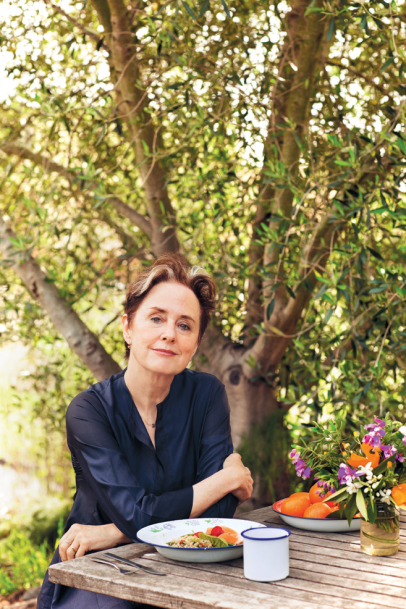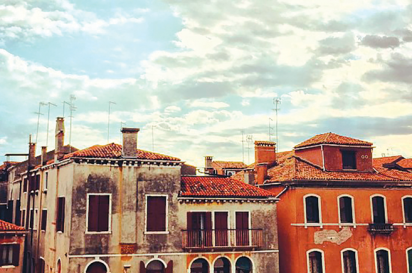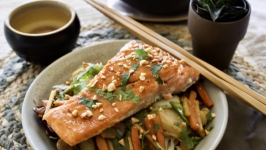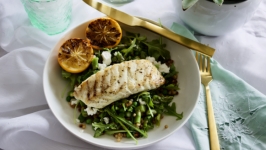Taste & See: What I Learned From Alice Waters
In the spring of my senior year, I met Alice Waters. Waters is a living legend in sustainable food. An author, activist and chef, over the last 40 years she’s pioneered the American farm-to-table movement, created the Edible Schoolyard project, served as vice president of Slow Food International and received accolades as one of the best chefs in the world on numerous occasions.
She arrived at Indiana University in spring 2016 to inaugurate our new Food Project, a center for food and gastronomical studies. We met for the first time at the intimate welcome lunch hosted in honor of her arrival. I asked her earnestly for the best way to change people’s minds and facilitate lasting change for our aching food system. She smiled broadly, clasped my hands in hers and said in her slow dreamy voice, “Just let them taste! Let them taste and they will see.”
Those words pulled me into a memory I have of my father while I was studying abroad in Bologna, Italy. The first night he visited me, I took him to a traditional trattoria. Seated under the stone porticos I ordered him tortellini in brodo, the city’s signature dish. When our server brought out the food, an admittedly minimalist presentation that bore no resemblance to American Italian food, my father’s expression contorted dismissively. “Just try it!” I prompted. He sipped the broth. He didn’t say anything. He sipped it again. He didn’t say anything. He ate a tortellino, his head tilted towards the bowl, and suddenly I realized he was crying.
“Dad! What’s wrong, is it bad?” He finally lifted his head, his eyes welling with tears, and, after another moment, he said, “I’ve never had anything like this before. It’s like, rather than the food coming to you, you have to go to it.”
This is the miracle of what Waters would call “true simple food,” food that is fresh, picked and processed at the peak of its ripeness, cooked using traditional methods.
A little less than a year after meeting Waters for the first time, I was invited to Northern California to meet her again. We ate at her restaurant in Berkeley, Chez Panisse. The menu was simple, rustic even: seasonal salads, chicken, duck, lamb, roasted vegetables and fresh bread. There was nothing present that I had never eaten before or that I could not conceivably produce locally back home in Indiana. The tastes, neither aggressive nor explosive, created a sensual harmony.
Simple food is an expression of love. Waters loves food. Not just eating, but food itself. She loves it with the romantic fervor of a new mother or a starry-eyed young girl. Waters has an ability to see the beauty and potential in raw ingredients the way a mother sees the charm and promise in her child’s macaroni sculpture or a young inamorata falls head over heels for the freckle behind her lover’s ear. Her gift lies in her ability to draw you into this romance, and to witness the miracle contained within the simplicity of the mundane.
Waters tells a story about the time Playboy magazine ranked Chez Panisse the seventh best restaurant in the country. The magazine invited many of the top chefs to New York City to cook a dish for this lavish party. Out of the 25 chefs, Waters was the only woman. And while the other chefs all prepared elaborate dishes—salmon quenelles, a lobster extravaganza—Waters made a simple mesclun salad.
I can just imagine Waters, with her delicate frame, presenting her salad in front of a herd of competitive male chefs. The statement, however unintentional it may have been, was profound. Food doesn’t need to be complex to be delicious. What could be simpler than green salad? It’s all about freshness!
In the first passage of her new book, Coming to My Senses, Waters talks about her attitude towards cooking: “First I’m at the farmers’ market. I am looking for fruits and vegetables that are perfectly ripe … things that were just picked. I’m not necessarily thinking about how the ingredients will go together—I’m just responding to what I’m finding … I’m using all of my senses … I don’t quite know what I’m going to cook … I’m improvising, trying to capture a moment in time.”
Of course, this doesn’t exactly answer the question of how to save the world. There is no ONE thing that will fix everything. Although, perhaps beginning to rekindle our relationship with our farmers is the best place to start. Places like Chez Panisse are literally reshaping the food economy by creating pathways for local organic farmers to sell their produce, and although we cannot expect fine-dining restaurants to feed the world, we can walk in their wake.
Chefs like Bloomington’s Erika Yochum, Nashville’s Jeremy Chase Barlow, Minneapolis’s Sean Sherman, Cambridge’s Will Turner and hundreds of other unsung local food heroes are doing this work around the country, finding the farmers and creating the pathways for a new food economy. Meanwhile, countless nonprofits (see sidebar) are bringing the skills of food production back to the general populace.
As long as there are idealists out there, pushing to be the change they want to see, then little by little, the art of learning to cook and to eat intuitively will transform our food system for the better. To love food is to love the land. When we begin to immerse ourselves in the processes behind our food, not out of fear but out of love, change will come.
Go ahead, taste and see.
Get Inspired! Learn more about the courageous people improving our food system.
Edible Schoolyard Project | Berkeley, CA | www.EdibleSchoolyard.org
The Ron Finley Project | Los Angeles, CA | www.RonFinley.com
The Land Institute | Salina, KS | www.LandInstitute.org
Mother Hubbard’s Cupboard | Bloomington, IN | www.MHCFoodPantry.org
North American Traditional Indigenous Food Systems | Minneapolis, MN | www.NATIFS.org








